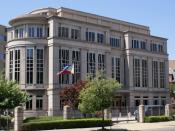Relations between the United States and the Philippines have been seemingly positive since the two countries initial association. However, the optimistic attitude and "big brother"-like role of the United States has, in the past, been a façade that the presidential administration of the US has used to cover up their imperialistic ideals. At the close of the nineteenth century, the United States no longer had any frontier to expand its territory and therefore began to consider imperialism as a logical step in its growth as a nation. The annexation of the Philippines was a direct cause of this altered form of imperialism, referred to as "Manifest Destiny" by most Americans. The American-Filipino relationship suffered a great deal from this dominant attitude, which converted to a negative attitude toward later Filipino immigrants trying to make a living on the American mainland. Our "Little Brown Brothers," as they were named by President Taft, were often mistreated to the same extremes as ex-slaves in the US south during the post civil war era.
At the dawn of the nineteenth century, hysteria encapsulated the United States concerning expansion and the ideals of imperialism and colonialism. With the success of the US in eradicating all outside influenced upon the continental US, it was inevitable that the next step would be to exert US power overseas. However, this was not an overwhelmingly supported cause by the American public, due to the US' previous experience with England and colonialism. These fears and doubts were muted, in part, by both William Randolph Hurst and his practice of yellow journalism and also by President McKinley's creation of "Manifest Destiny." Through the aid of these methods, Americans were persuaded to believe that it was their God-given right to expand US territory across the globe. The perfect opportunity arose to...


